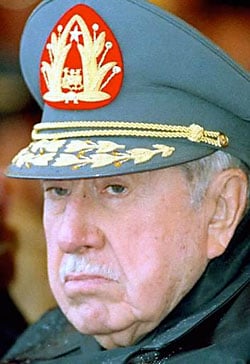
Authoritarian Rule under Pinochet
After the overthrow and death
of Allende, the military junta took power. Leaders General Auguto
Pinochet Ugarte, General Gustavo Leigh Guzmán, Admiral José Toribio Merino, and
General César Mendoza

justified the coup as necessary to stamp out Marxism, restore order, and salvage Chile’s economy. The military junta declared a ‘state of war’ in Chile and implemented a curfew. The junta closed Congress, forbade political party activity, banned union activities, and censored the media. Thousands of Chileans were murdered, jailed, tortured, or exiled, especially those connected to the Popular Unity Party.
Cesar Mendoza (Police General), Jose Toribio Merino (Admiral of Navy), General Pinochet, and Gustavo Leigh Guzman (General of Air Force) in Septemeber 1973. www.ua.es/up/pinochet/imagenes/ fotopinochett2g.jpg
The secret police, the Directorate of National Intelligence (DINA), kept civilians living in fear (“Chile,” np).
In June 1974, Pinochet formally became president of the Republic of Chile. Responding to international criticism concerning human rights abuses under Pinochet’s rule, the government held a national plebiscite in 1978. Every Chilean over the age 18 was to vote yes or no to confirm or disconfirm Pinochet’s regime and Chile’s sovereignty. According to the government, 75% of Chilean voters voted yes to support Pinochet. In a plebiscite in 1980, Chileans approved a new Constitution that gave Pinochet an eight-year presidential term, which would begin in 1981 and continue through 1989 (O’Shaugnessy, 78-119).
Under his authoritarian rule, Pinochet helped improve the economy between 1977 and 1981. This new economic program, designed by civilian technocrats, known as the “Chicago Boys” initiated free market economics in Chile. The liberalization and privatization of the economy helped lower inflation and stimulate production. However, the worldwide recession and the declining price of copper caused the Chilean economy to plummet. Once again inflation and the unemployment rate rose.
In 1983, mass demonstrations and protests
against the government began.
 The
increased opposition led Pinochet to re-impose a state of siege in 1984.
Repression intensified even more after an unsuccessful attempt on
Pinochet’s life in 1986.
The
increased opposition led Pinochet to re-impose a state of siege in 1984.
Repression intensified even more after an unsuccessful attempt on
Pinochet’s life in 1986.
To the right: Human rights demonstration in downtown Santiago in the 1980s. http://www.derechoschile.com/derechos/photo_gallery_eng.ht
Above: Demonstration before the 1988 plebiscite. Sign reads: "No more fear." http://www.derechoschile.com/derechos/photo_gallery_eng.ht
In 1988, Chileans rejected a plebiscite that would have allowed Pinochet to rule for a second term beginning in 1989. In December 1989, Chileans elected Patricio Aylwin Azócar to the office of president (“Chile,” np). When Aylwin was inaugurated in 1990, Pinochet stepped down as chief executive of Chile, but he kept his position as army commander until 1998.
 In
2001, Pinochet was charged with committing kidnapping and murder during his rule
as president of Chile. Later, Pinochet’s charges were reduced to his acting as
an accessory to the brutal crimes. The Santiago Court of Appeals declared
Pinochet mentally unfit to stand trial and dismissed the legal proceedings in
2001 (“Pinochet,” np).
In
2001, Pinochet was charged with committing kidnapping and murder during his rule
as president of Chile. Later, Pinochet’s charges were reduced to his acting as
an accessory to the brutal crimes. The Santiago Court of Appeals declared
Pinochet mentally unfit to stand trial and dismissed the legal proceedings in
2001 (“Pinochet,” np).
Above: Pinochet in 1998, krant.telegraaf.nl/.../teksten/ jo98.mrt.pinochet.html
Works Cited
“Chile.” Library of Congress Country Studies. www.countryreports.org
O’Shaughnessy, Hugh. Pinochet: The Politics of Torture. New York: New York University
Press, 2000.
“Pinochet Ugarte, Augusto.” Encarta Online. http://encarta.msn.com
For more information:
Constable, Pamela and Arturo Valenzuela. A Nation of Enemies: Chile under Pinochet. New
York: W.W. Norton, 1993.
Drake, Paul W and Iván Jaksic, eds. Struggle for Democracy in Chile, 1982-1990. Lincoln:
University of Nebraska Press, 1995.
Edwards, Sebastian and Alejandra Cox Edwards. Monetarism and Liberalization: the Chilean
Experiment. Chicago: University of Chicago Press, 1991.
Sigmund, Paul. The Overthrow of Allende and the Politics of Chile, 1964-1976. Pittsburgh:
University of Pittsburgh Press, 1977.
Valenzuela, J. Samuel and Arturo Valenzuela, eds. Military Rule in Chile: Dictatorships and
Oppositions. Baltimore: John Hopkins University Press, 1986.